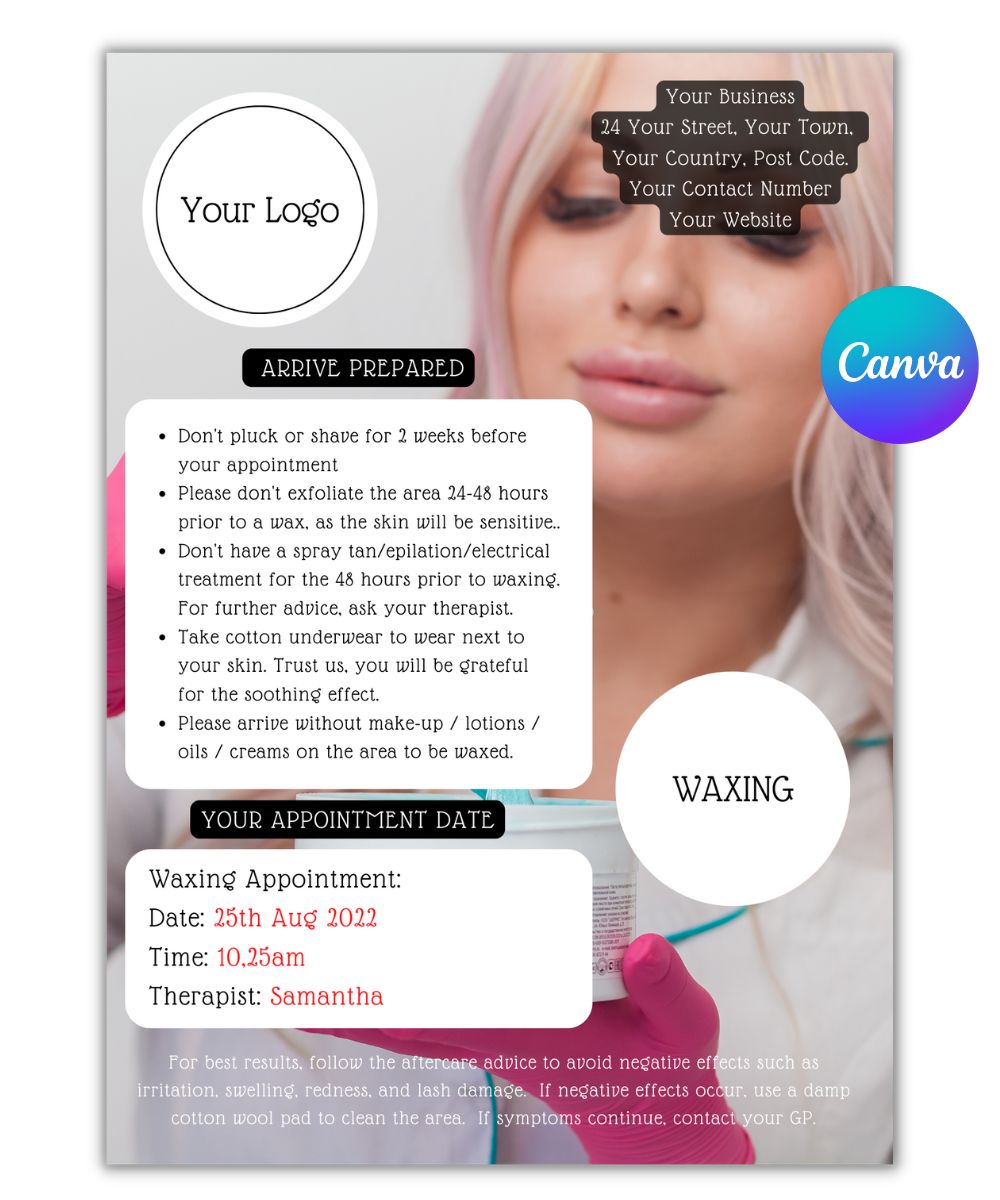
When we spend time and money investing in our training, it makes no sense to avoid giving clients the proper aftercare, and ensuring they have received it in good time for it to be beneficial for their use.
While carrying out treatments, giving aftercare advice should simply be part of your daily routine, a mindset that you wake up with every morning.
There are definitely some reasons for the correct distribution and handing out to your clients, but here are the top ten reasons for giving aftercare advice

1 – Professionalism
Any good aesthetician or therapist, KNOWS aftercare advice is essential for the health of their clients. Without it, your client will not get the best from their treatment, and may even suffer from some of the many contra actions that can occur. A contra-action is where something might go wrong. Your client needs to know what to do if there is a problem.
2 – Safety
If something goes wrong after a treatment, does your Client know what to do, or have you decided that simply because you told them, they will remember it? Clients tend to be in relaxation mode for beauty therapy treatments, or worried mode if it is an aesthetic treatment such as Botox or Fillers, and not really concentrating on what might go wrong, or what to do if the worst happens.
3 – Insurance Cover
Yes, it’s important. Incredibly important. The UK is not an incredibly litigious society as yet, but it may well come, and every year, there are cases taken to court over damage to a client, saying a hair or beauty treatment was at fault.
While we cannot head all potential claims off at the pass, having your client receive aftercare advice in writing, can go a long way in preparing a defence. What if you find yourself being in a situation where the onus is on you to prove there was no harm, rather than on the ex client to prove that you did harm?
Claims can be brought years after a treatment, and being able to prove you gave the correct advice can be beneficial, especially as you may have long forgotten who the Client actually was, or what they looked like. At the start, we tend to think we will remember everyone, but the reality is, we remember our regulars, and people who visit once, we may remember some, but many will slip from memory.
4 – Peace of Mind
This heads us straight back to professionalism. As industry professionals, we want to know we have done the best for our clients, after all, returning clients are our bread and butter. Without them, we wouldn’t be paying the bills every month. And this is where it becomes helpful to distinguish our own practices from those who don’t care about their clients, and just want the money coming in.
5 – Correct Procedure
As part of your training, you will have come across contra-indications and contra-actions.
Contra-indications are where a client is not suitable to receive a treatment. For example, a client who is allergic to PPD, cannot have most treatments which involve hair dye, from hairdressers, barbers, beauticians and therapists.
A Contra-action is something that may occur as part of a treatment, for example, a client who is having a Microdermabrasion treatment, may find they have mild erythema (redness) after the treatment for up to 24 hours.
With the correct aftercare advice, the client will know which contra-actions are normal, as part of the treatment, and allow them to know if something more serious happens, such as difficulty breathing, that it is time to seek medical assistance.
7 – Sales Opportunity
Giving written aftercare is also an opportunity. As part of that process, giving your Client the correct information for after their treatment, there is the option to use that document for other purposes.
For example:
- State how long between appointments, and offer to rebook the next appointment.
- Explain complimentary services to enhance current services.
- Write about aftercare sales products that will help Clients to maintain the results achieved.
- Show offers and discounts.
- Write your web address, email and social media account details.
8 – Appointment Card
Your aftercare advice sheet can act as a reminder appointment card for their next appointment. If you add advice for before their appointment, it can act as an all encompassing document for your business and to give your client as a reminder of what else you do.
9 – Options
There are many different ways to hand out Aftercare. but for your own records, having your Client sign to accept it is a practice which is recommended going forward, as a way to prove your Client has received the correct advice. You can choose to do this several ways, such as:
- If you use a booking system, there may be a checkbox option for Clients to confirm they have read and accepted your terms and conditions / booking requirements and aftercare advice.
- E-Mail prior to attending an appointment, and receiving confirmation back that your client has received the E-Mail.
- At the appointment, as a document, and signed for on the consultation form.
10 – Follow Up
Aftercare advice gives you the opportunity to inform your Client that you will follow up their appointment, to help them achieve the best possible outcome after receiving your service. This can lead to recommendations, reviews and opportunities to improve your own services and delivery as a result of evaluation opportunities.
-
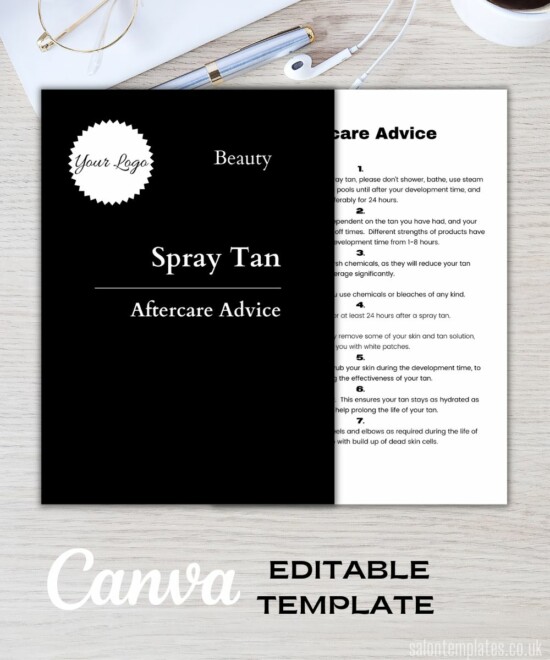 Spray Tan Aftercare Advice Template – Monochrome (Canva Template – Editable)£1.99
Spray Tan Aftercare Advice Template – Monochrome (Canva Template – Editable)£1.99 -
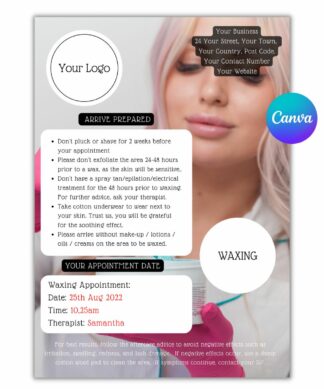 Learning & Aftercare Leaflets – Waxing (Canva Template – Editable)£2.50
Learning & Aftercare Leaflets – Waxing (Canva Template – Editable)£2.50 -
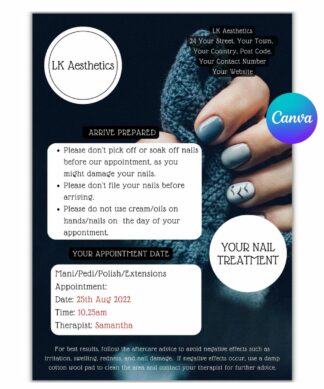 Learning & Aftercare Leaflets – Nails (Canva Template – Editable)£2.50
Learning & Aftercare Leaflets – Nails (Canva Template – Editable)£2.50 -
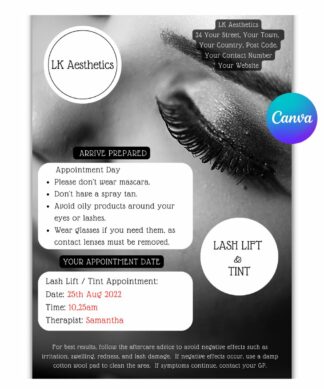 Learning & Aftercare Leaflets – Lash Lift (Canva Template – Editable)£2.50
Learning & Aftercare Leaflets – Lash Lift (Canva Template – Editable)£2.50 -
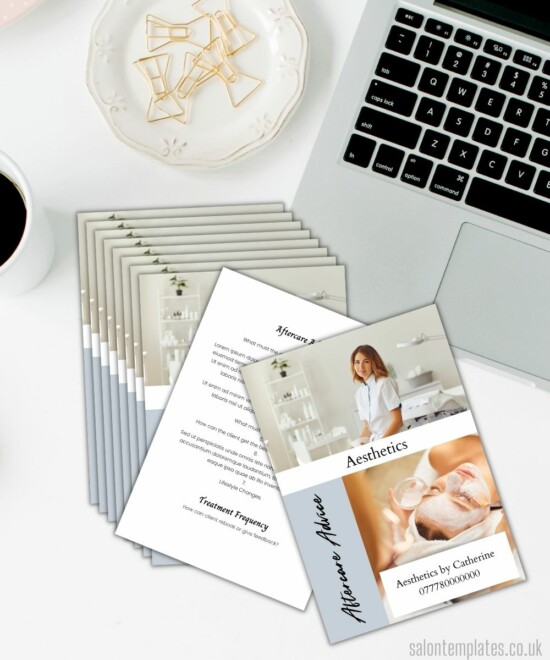 Aesthetics Aftercare Advice – (Canva Template – Editable)£2.99
Aesthetics Aftercare Advice – (Canva Template – Editable)£2.99 -
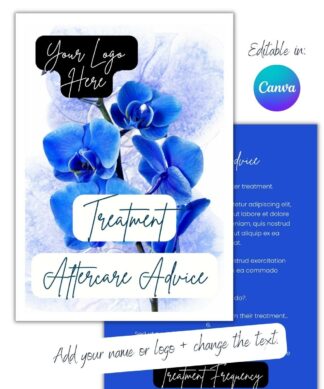 Royal Blue Orchid Aftercare Advice – (Canva Template – Editable)£2.99
Royal Blue Orchid Aftercare Advice – (Canva Template – Editable)£2.99 -
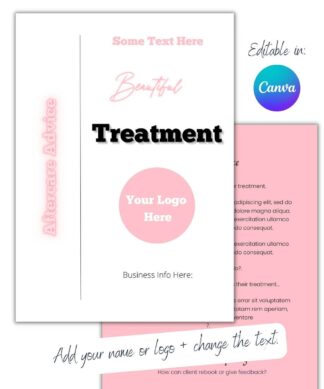 Sugar Cane Aftercare Advice – (Canva Template – Editable)£2.99
Sugar Cane Aftercare Advice – (Canva Template – Editable)£2.99 -
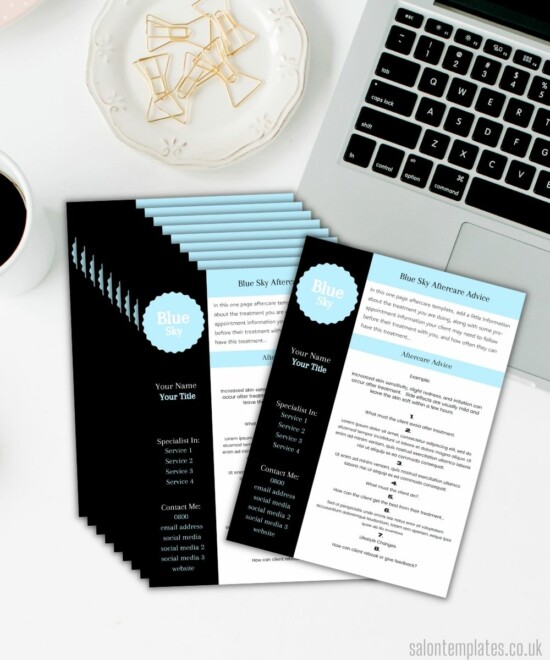 Blue Sky Aftercare Advice – One Page Template (Canva Template – Editable)£1.99
Blue Sky Aftercare Advice – One Page Template (Canva Template – Editable)£1.99 -
 Nail Treatments Aftercare Advice Template – Monochrome (Canva Template – Editable)£1.99
Nail Treatments Aftercare Advice Template – Monochrome (Canva Template – Editable)£1.99 -
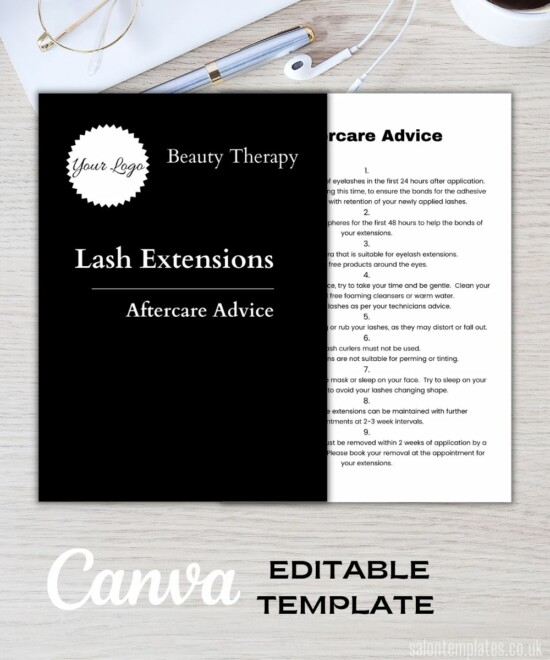 Lash Extensions Aftercare Template – Monochrome (Canva Template – Editable)£1.99
Lash Extensions Aftercare Template – Monochrome (Canva Template – Editable)£1.99 -
 Microdermabrasion Aftercare Template – Monochrome (Canva Template – Editable)£1.99
Microdermabrasion Aftercare Template – Monochrome (Canva Template – Editable)£1.99 -
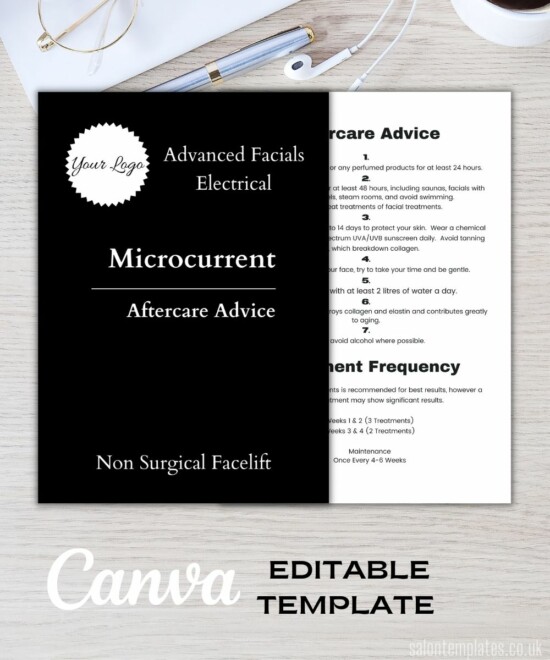 Facial Microcurrent Aftercare Template – Monochrome (Non Surgical Facelift) (Canva Template – Editable)£1.99
Facial Microcurrent Aftercare Template – Monochrome (Non Surgical Facelift) (Canva Template – Editable)£1.99 -
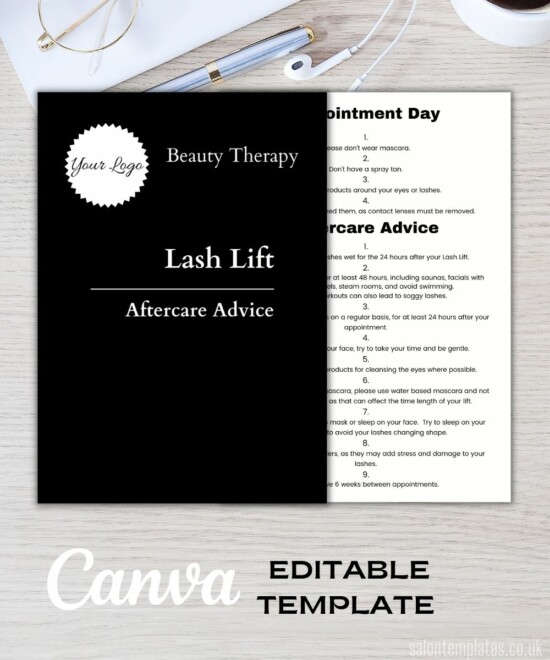 Lash Lift Aftercare Template – Monochrome (Canva Template – Editable)£1.99
Lash Lift Aftercare Template – Monochrome (Canva Template – Editable)£1.99 -
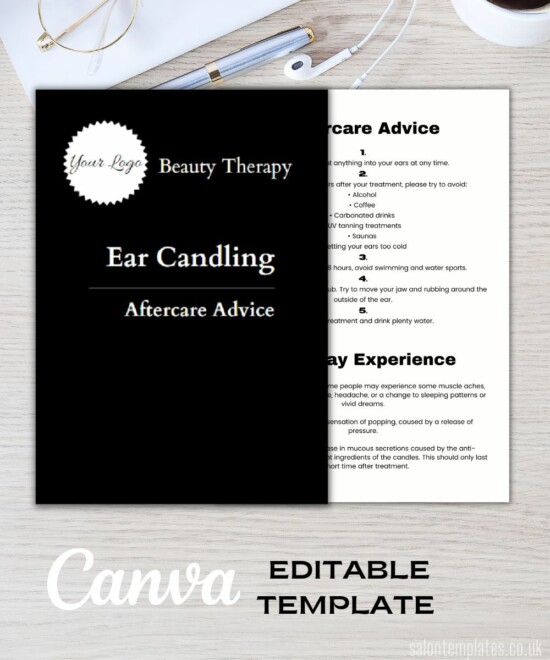 Ear Candles Aftercare Template – Monochrome (Canva Template – Editable)£1.99
Ear Candles Aftercare Template – Monochrome (Canva Template – Editable)£1.99 -
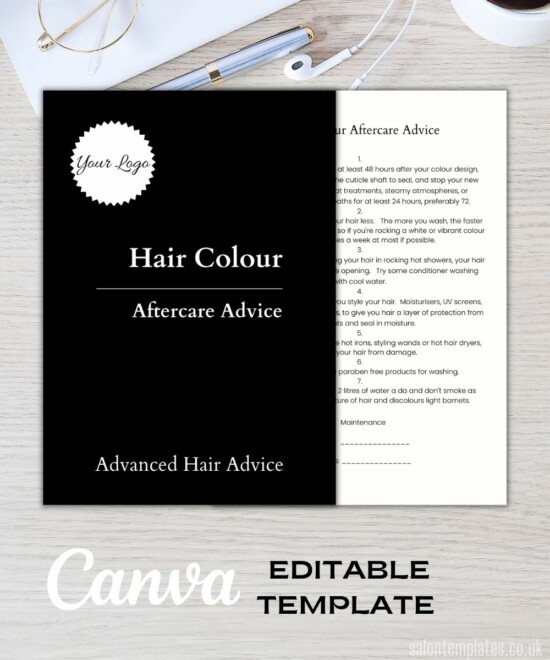 Hair Colour Aftercare Template – Monochrome (Canva Template – Editable)£1.99
Hair Colour Aftercare Template – Monochrome (Canva Template – Editable)£1.99 -
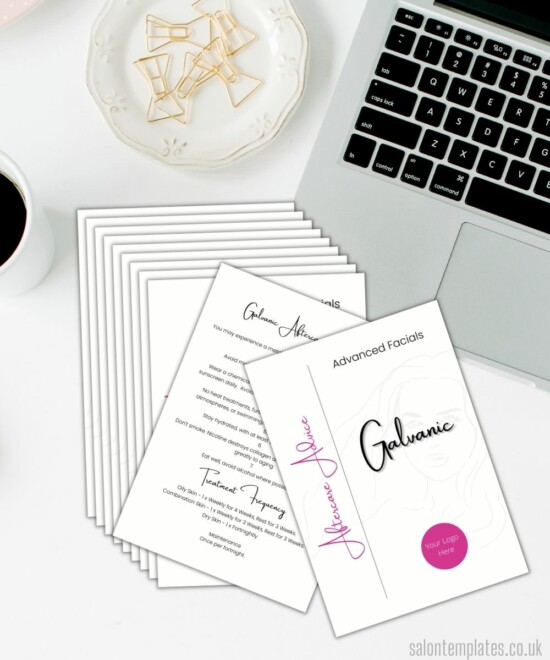 Facial Galvanic Simple Aftercare Template (Canva Template – Editable)£1.99
Facial Galvanic Simple Aftercare Template (Canva Template – Editable)£1.99 -
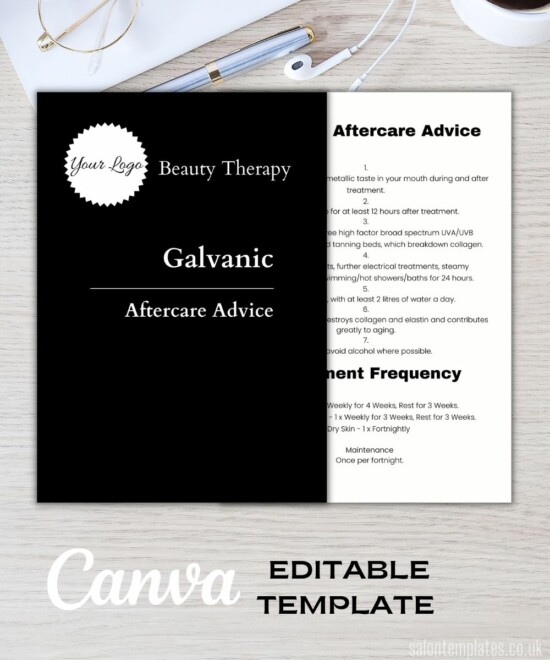 Facial Electrical Galvanic Treatment Aftercare Template – Monochrome (Canva Template – Editable)£1.99
Facial Electrical Galvanic Treatment Aftercare Template – Monochrome (Canva Template – Editable)£1.99